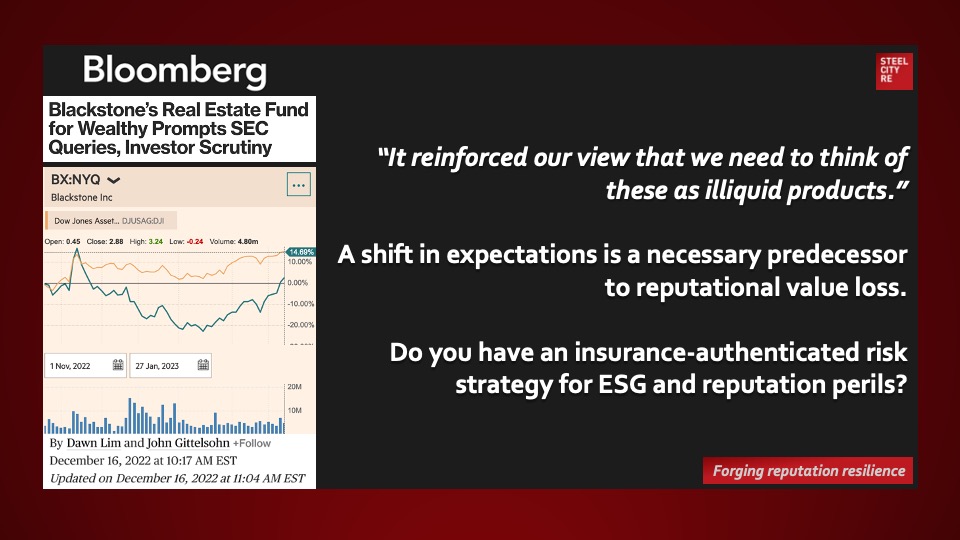Liquidity Issues at Blackstone
Given Blackstone’s status in the industry, the increase in withdrawal requests has drawn attention to the complexity of packaging highly illiquid assets such as real estate or private credit into funds that offer cash back when investors want – to a limit…[There are now] questions about whether the people actually knew the risks, from higher fees than stock and bond funds to the illiquidity of the assets, and even the incentives advisers might get to push certain products.
Click on the image above to read more (Bloomberg Paywall).

To prevent a further loss in reputational value, Blackstone has to prevent a catastrophic shift in stakeholder expectations
Bloomberg: January 28, 2023

Comment. The demand for redemptions and liquidity issues at Blackstone are unlikely to stay siloed in its real estate funds, says Nir Kossovsky, author of three books on corporate reputation and CEO of reputation insurer Steel City Re. Liquidity risk in any part of a company’s operation causes reputational risk for the entire enterprise. And reputational issues create a “run on the bank” mentality among both investors and shareholders. Noteworthy, says Kossovsky, is that Blackstone has underperformed by 14.6% the Dow Jones U.S. Asset Managers Index (DJUSAG) since early November. Still to come, he predicts, increased attention from regulators and lawsuits.
“To prevent a further loss in reputational value, Blackstone has to prevent a catastrophic shift in stakeholder expectations,” says Nir Kossovsky, author of three books on corporate reputation risk and CEO of reputation insurer Steel City Re. “Telling stakeholders ranging from customers, regulators, and investors a strategic story of effective risk management is what deposit insurance did for banks after the Great Depression and what ESG-linked reputation insurance is doing for a wide range of companies more recently,” says Kossovsky.
Reputation is Mission-Critical
Liquidity Issues at Blackstone. Oversight of “mission- critical” issues can forestall a broad range of costly issues associated with angry disappointed stakeholders. Losses accrue as companies lose the ability to sell more, faster, and at premium prices; to obtain labor, vendor services, as well as capital on preferred terms; to outperform competitors, deter activists, and assuage regulators. Public manifestations include litigation, regulatory opprobrium and adverse media attention.
A program for reputation resilience, comprising both risk management and insurance (reinsurance)-authenticated oversight for all that is mission-critical, can create value in many ways. To this end, Steel City Re offers a Reputation Resilience Program.
Having a robust Reputation Resilience Program in place offers, amongst other benefits:
- Protection for the company, its staff, executives, and board from litigation and regulatory challenges
- Improved governance processes and better enterprise risk management protocols; i.e., measuring reputational risk
- Establishment of an agile operating, communications, and decision-making team, with clear roles and responsibilities, trained and ready to handle all reputational threats; i.e., a reputation risk management framework
- Proactive management of risks that could give rise to delays or derailing concerns around new product and strategic partnership launches
- Captured behavioral economic value from stakeholders; i.e., value of reputation
- Reduced costs of debt and risk transfer while boosting equity value; i.e., boosting reputational value
A hazard of reputation risk is a lurking gap between stakeholder expectations and reality. Another hazard is the emotional intensity associated with expectations. The peril is anger from disappointed stakeholders. This video and this written summary explain the behavioral economic features of the many perils of reputation risk.
Mitigating risk strategically through expectation management and operational adjustments evinces thoughtful management and dutiful governance. Financing such risks evinces prudence, and doing so publicly enables stakeholders to appreciate and value the effort. These comprise the core of Steel City Re’s professional services.
One Question
Liquidity Issues at Blackstone. ESG-linked reputation risks are prevalent and material. Are reinsurance and insurance for ESG-linked reputation risk part of your strategy?

